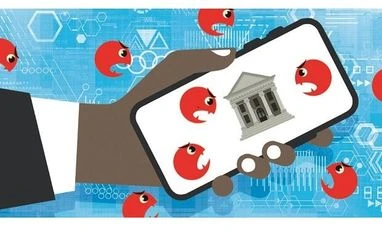After CERT-In's advisory, several Indian banks, including HDFC Bank and IDBI Bank, have alerted their customers to not download their mobile applications from any source other than official app stores.
A new version of the Trojan virus, SOVA, has reportedly targeted over 200 mobile banking and crypto apps and is stealing their login credentials and cookies.
The virus can encrypt the user's Android phone for ransom.
"It has been reported to CERT-In that Indian banking customers are being targeted by a new type of mobile banking malware campaign using SOVA Android Trojan," CERT-In said.
What is SOVA?
SOVA is an Android banking trojan malware that targets banking apps to steal personal information and adds false layers over a range of apps. The layers help the malware mimic the payment app.
The malware was first detected for sale in the underground markets in September 2021. It could "harvest usernames and passwords via keylogging, stealing cookies and adding false overlays to a range of apps", according to CERT-In.
The virus primarily focused on the USA, Russia, and Spain. However, by July 2022, It had added other countries, including India, to its list.
The malware spreads through files with an extension ".apk".
How does SOVA work?
According to CERT-In, the malware spreads through smishing. Smishing is a process where fraudulent SMS are sent to individuals prompting them to share their details, including passwords.
Once the app is downloaded on the mobile, the malware sends the list of all the downloaded apps to the server that the attacker controls.
The server sends back the list of targeted apps to the malware and stores the critical information in an XML file. The malware and the server then manage the apps.
What can the SOVA virus do?
There are several functions an SVA malware can perform. These include performing gestures like swiping, stealing cookies, taking screenshots, and adding false overlays.
The virus has also undergone an update. Now, it can encrypt all the data and hold it for ransom.
Among the most crucial updates is the "protections" module. Now, when a user tries to uninstall an app that the virus has attacked, they will be unable to do so. A message, "This app is secured", will be displayed on the screen.
What can users do to protect themselves?
The most important step is downloading the apps only via official app stores. Another step is to check the "Additional Information" section while downloading the apps and review the app details, number of downloads and user reviews.
Another practice CERT-In recommends is downloading the latest updates of the apps and operating software provided by device vendors. Also, download and activate anti-virus software.
"Do not browse un-trusted websites or follow un-trusted links and exercise caution while clicking on the link provided in any unsolicited emails and SMSs," CERT-In's notification read.
Also, the users have been advised to click only on the URLs that indicate a legitimate website. The users must also keep the firewall on.
Lastly, the users have also been asked to immediately report any unusual activity in the bank accounts to the respective bank.
Unlock 30+ premium stories daily hand-picked by our editors, across devices on browser and app.
Pick your 5 favourite companies, get a daily email with all news updates on them.
Full access to our intuitive epaper - clip, save, share articles from any device; newspaper archives from 2006.
Preferential invites to Business Standard events.
Curated newsletters on markets, personal finance, policy & politics, start-ups, technology, and more.
)